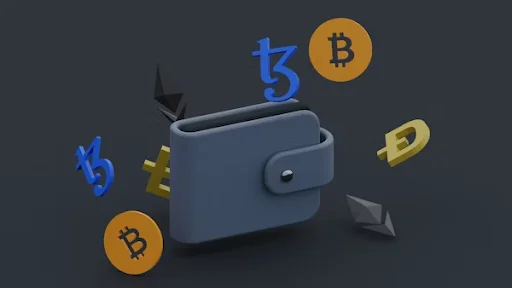Crypto Wallets vs Exchanges in 2025: What Every Investor Needs to Know
The world of crypto is always moving forward, so the big question for investors is which is safer, holding your digital currency in a wallet or leaving it on an exchange? By 2025, when the industry matures and becomes adopted by more people globally, it becomes vital to understand the main differences between a crypto wallet and an exchange.
Deciding on the right tool for asset management now matters more than ever because it can influence your safety, financial freedom and opportunities in Web3. In this article, we’ll elaborate on the differences between wallets and exchanges, share the best situations to choose each and highlight why Bitget Wallet is quickly gaining popularity among experts.
The Evolution of Wallets and Exchanges in 2025
In the beginning, most crypto enthusiasts trusted exchanges when it came to holding their funds. Buying, selling and trading cryptocurrencies was easiest to do through a centralized exchange such as Bitget. The combination of easy onramps, trading options and a simple interface made them the top choice for millions.
However, as blockchain technology advanced and the Web3 movement gained traction, a growing number of users started moving away from custodial services in search of self-sovereignty — and that’s where wallets took center stage.
By 2025, crypto users now distinguish between exchanges, which are primarily for active trading and buying/selling, and wallets, which are ideal for long-term holding, DeFi access, NFT management, and true ownership of assets.
How Wallets and Exchanges Serve Different Needs?
The difference between wallets and exchanges boils down to one fundamental question: Who controls your crypto?
When you store assets on an exchange, you’re essentially allowing the platform to hold your crypto on your behalf. It’s convenient, especially for newcomers, but it comes with trade-offs. You don’t own your private keys, and your funds are susceptible to exchange hacks, withdrawal freezes, or regulatory interventions.
In contrast, a crypto wallet—especially a non-custodial one—places full control in your hands. You manage your private keys, access decentralized applications (dApps), stake tokens, receive airdrops, and explore Web3 with total autonomy.
To sum it up:
- Exchanges are perfect for quick trades, fiat conversions, and liquidity.
- Wallets offer unmatched security, ownership, and access to decentralized finance.
Still unsure which suits your needs? Here’s a complete breakdown of the differences between a crypto wallet vs exchange that can help you decide based on your goals.
Why Bitget Wallet Is Winning Over the Web3 Community?
As more users look beyond trading and into DeFi, NFTs, and blockchain gaming, wallet solutions are becoming critical. Bitget Wallet (formerly BitKeep) is at the forefront of this shift, offering a robust, user-first experience for the modern crypto investor.
Here’s why it’s quickly becoming a favorite in 2025:
✅ You Own Your Keys
Bitget Wallet is non-custodial, meaning you hold the keys to your funds. No third-party can access or freeze your assets.
🌐 Seamless Multi-Chain Support
Whether you’re transacting on Ethereum, Solana, BNB Chain, or Arbitrum, Bitget Wallet lets you manage it all in one place. It supports over 90 blockchains — and counting.
💱 Built-In Swap and DEX Aggregator
Need to swap tokens across chains? Bitget Wallet includes a powerful decentralized exchange aggregator, ensuring you get the best trading rates with minimal friction.
🧠 Web3 and DeFi Access
Beyond storage, Bitget Wallet is a full gateway to Web3. Connect directly with DeFi protocols, stake tokens, mint NFTs, or participate in IDOs and GameFi projects — all without leaving your wallet.
🔒 Enhanced Security
With multiple layers of encryption, optional biometric authentication, and advanced recovery options, Bitget Wallet is built for security-conscious users.
Ready to explore the decentralized side of crypto? Click here to discover how Bitget Wallet gives you full control and Web3 access — all in one app.
When to Use a Crypto Wallet vs an Exchange: Real-World Examples?
Let’s make it practical. Suppose you just bought ETH on Bitget Exchange. If your goal is to trade actively, it makes sense to keep the funds there temporarily. You can access liquidity, trading pairs, and advanced tools like leverage or futures.
But if your plan is to:
- Hold your ETH for the long term
- Stake it in a DeFi pool
- Use it to mint an NFT or join a DAO
Then moving your ETH to Bitget Wallet gives you more flexibility, privacy, and control. It’s also safer in the long run, especially in case of exchange outages, hacks, or regulatory issues.
In 2025, savvy users blend both tools they use exchanges for execution, and wallets for storage, investment, and Web3 interaction.
Final Thoughts: Take Control of Your Crypto Journey in 2025
Crypto adoption has grown exponentially, but so have the risks. As regulations tighten and centralized services face more scrutiny, one thing is clear — ownership matters more than ever.
By understanding the true difference between a crypto wallet vs exchange, you can build a safer, smarter crypto strategy that protects your assets while giving you room to grow and explore.
Platforms like Bitget Wallet offer the perfect middle ground: advanced functionality, full self-custody, and a sleek interface for managing your digital life.👉 Curious how Bitget Wallet compares to other tools? Download bitget wallet now and dive into this complete guide to choosing between Bitget Wallet and Bitget Exchange and make 2025 the year you take full control of your crypto future.







